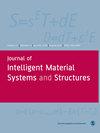Hybrid dynamical modeling of shape memory alloy actuators with phase kinetic equations
IF 2.2
3区 材料科学
Q3 MATERIALS SCIENCE, MULTIDISCIPLINARY
Journal of Intelligent Material Systems and Structures
Pub Date : 2024-08-05
DOI:10.1177/1045389x241265617
引用次数: 0
Abstract
Shape memory alloy morphing actuators are a type of composite soft actuator with many attractive properties such as large deformation, small form factor, self-sensing ability, and physical reservoir computing potential. These actuators are composed of active shape memory alloy wires and a passive material to magnify the overall deflection. However, the dynamic modeling of these actuators is difficult due to both shape memory alloy characteristics and the nonlinearity of the passive layer. Here, a hybrid dynamical model is proposed that couples the phase kinetics and thermal modeling for the shape memory alloy with a dynamic Cosserat beam model. This hybrid model is benchmarked against experimental linear and morphing actuators resulting in a root mean squared error of 0.87 mm for the linear actuator and root mean squared error of 1.34 and 1.42 mm for the two morphing actuator configurations evaluated in this work. This model applies continuous phase kinetic equations in a comprehensive hybrid dynamical model to accurately simulate the hysteretic transition of the alloy, which is then coupled to a high deformation beam model. This work can expand the capability and design of novel morphing actuators to achieve specified dynamic characteristics for increased application in robotic fields.利用相位动力学方程对形状记忆合金致动器进行混合动力学建模
形状记忆合金变形致动器是一种复合软致动器,具有变形量大、外形尺寸小、自感应能力强和物理存储计算潜力大等诸多诱人特性。这些致动器由主动形状记忆合金线和被动材料组成,可放大整体挠度。然而,由于形状记忆合金的特性和被动层的非线性,这些致动器的动态建模非常困难。本文提出了一种混合动力学模型,将形状记忆合金的相动力学和热建模与动态 Cosserat 梁模型结合起来。该混合模型以实验中的线性和变形致动器为基准,结果是线性致动器的均方根误差为 0.87 毫米,而本研究中评估的两种变形致动器配置的均方根误差分别为 1.34 毫米和 1.42 毫米。该模型在一个综合混合动力学模型中应用了连续相动力学方程,以精确模拟合金的滞后转变,然后将其与高变形梁模型耦合。这项工作可以扩展新型变形致动器的能力和设计,使其达到指定的动态特性,从而增加在机器人领域的应用。
本文章由计算机程序翻译,如有差异,请以英文原文为准。
求助全文
约1分钟内获得全文
求助全文
来源期刊
CiteScore
5.40
自引率
11.10%
发文量
126
审稿时长
4.7 months
期刊介绍:
The Journal of Intelligent Materials Systems and Structures is an international peer-reviewed journal that publishes the highest quality original research reporting the results of experimental or theoretical work on any aspect of intelligent materials systems and/or structures research also called smart structure, smart materials, active materials, adaptive structures and adaptive materials.

 求助内容:
求助内容: 应助结果提醒方式:
应助结果提醒方式:


